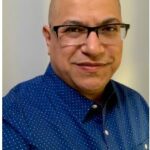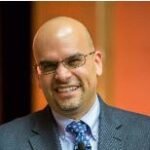DURHAM, N.C. — In 2002, during his psychiatry residency at the School of Medicine at the University of North Carolina at Chapel Hill, Luke Smith saw a gap in services to low-income Latino patients, both in the emergency room at UNC Hospitals and at the Carrboro Community Health Center, where he volunteered Monday nights.
Many of the patients were recent immigrants who were confused and frightened, facing the stress of jobs and a new culture, and with psychiatric problems they were not comfortable talking about that showed themselves in physical symptoms, he says.
Yet at the clinic and at the emergency room, which patients typically visited as a last resort, he says, the people working the front desks did not speak Spanish and so did not accurately communicate to the physicians on duty the underlying nature of the patients’ problems.
So near the end of his residency, Smith sent an email message to five academic colleagues to spell out challenges he saw, and to suggest ways to better serve patients.
A few days later, he had received responses from 80 people who had seen his email. Then, after a series of meetings, a group of those people founded El Futuro, a nonprofit that has the mission of advancing bilingual and “culturally informed” behavioral health treatment for underserved, Spanish-speaking individuals and families.
Launched in Carrboro, El Futuro now is based in Durham and also runs a clinic in Siler City. It operates with an annual budget of $1.5 million, 27 employees and 20 volunteers.
In 2015, it provided over 8,900 sessions to nearly 1,500 patients, or just over six visits per patient.
“We’re by and large talking about an immigrant community who are coming to the U.S. to strengthen their family and for working,” says Smith, executive director of El Futuro. In visiting the clinic, he says, immigrants are “motivated to get back to work or their education, or to get their children into school, or to have a healthy family.”
Immigrants in the U.S. generally are healthier psychologically than the population overall and experience less schizophrenia, depression or anxiety, yet the longer they stay in the U.S., the more the incidence of those conditions among immigrants approaches those of the population overall, Smith says.
“For some reason, it seems like we make them sicker,” he says.
Compounding the stress of living in a different culture, he says, are policies and attitudes toward immigrants that are not welcoming or hospitable and sometimes hostile. And the children of immigrants typically experience rates of mental illness similar to those of the general population, Smith says.
El Futuro now is exploring expansion to serve more people in more regions by participating in collaboratives and through “integrated care” that provides behavioral health services in a primary care setting.
While not a formal partner in the East Durham Children’s Initiative, for example, El Futuro works closely with the collaborative, and also with the Family Success Alliance in Orange County, both of which emphasize a “two-generation approach to help not just the child but the caregiver as well,” Smith says.
“We’ve always focused on children and families because we can’t separate the two,” he says. “We’re not just happy with you saying your outcome is getting children more ready for school but also getting the parent a good stable job so the home is stabilized.”
And El Futuro clinical staff spend part of their time at Piedmont Health Services in Carrboro — part of the same clinic system for which Smith volunteered during his residency.
El Futuro draws patients from 15 counties but is not easily accessible to them, Smith says.
So the nonprofit also is looking for ways to partner with public schools and groups such as Communities in Schools and United Way member agencies to provide “strategic interventions that can support these students,” Smith says.
And it provides year-long training each for five to six graduate students from Duke University, North Carolina State University and the University of North Carolina at Chapel preparing to be physicians, psychiatrists, family doctors, psychiatric nurse practitioners or social workers
To serve more immigrants, Smith says, “we need a bigger potential workforce.”
Last week, El Futuro was awarded a $500,000 grant over four years from Oak Foundation and will use the funds to increase the number of people it serves.
Providing better psychiatric services to immigrants also can mean a positive return on investment for businesses, he says.
“If a person is depressed and misses work and then has to be replaced,” he says, “instead of having to replace that person, and its cost, we can get that person back to work in six treatment sessions that typically last two to three months. Our essence is to get people back to work and back into school.”


 Alvely Alcántara, LCSW
Alvely Alcántara, LCSW Rossy C. Garcia, MEd
Rossy C. Garcia, MEd  Katy Sims, MD
Katy Sims, MD  Everardo Aviles, LCSW, LCAS (Eve)
Everardo Aviles, LCSW, LCAS (Eve) As a medical anthropologist and social work researcher, Dr. Gulbas’ research embodies interdisciplinarity through the integration of applied theories of health and human development with qualitative and ethnographic methodologies. Her work seeks to understand how people—children, families, and providers—navigate complex sociocultural landscapes in the pursuit of mental health. Most of her work, to date, focuses attention on developing more robust interpretations of suicide risk. With funding from the National Institutes of Mental Health, this body of research has contributed to advancements in theoretical and empirical knowledge of the broader contexts within which youth suicide risk is situated.
As a medical anthropologist and social work researcher, Dr. Gulbas’ research embodies interdisciplinarity through the integration of applied theories of health and human development with qualitative and ethnographic methodologies. Her work seeks to understand how people—children, families, and providers—navigate complex sociocultural landscapes in the pursuit of mental health. Most of her work, to date, focuses attention on developing more robust interpretations of suicide risk. With funding from the National Institutes of Mental Health, this body of research has contributed to advancements in theoretical and empirical knowledge of the broader contexts within which youth suicide risk is situated.  R. Gabriela Barajas-Gonzalez is a developmental psychologist and an assistant professor of Population Health at NYU Grossman School of Medicine. Dr. Barajas-Gonzalez is the principal investigator of a study that examines the impact of immigration-related threat and stress on school communities. She earned a PhD in developmental psychology from Columbia University and hold a BA in human biology from Stanford University. Dr. Barajas-Gonzalez is the daughter of Mexican immigrants and a first gen college student.
R. Gabriela Barajas-Gonzalez is a developmental psychologist and an assistant professor of Population Health at NYU Grossman School of Medicine. Dr. Barajas-Gonzalez is the principal investigator of a study that examines the impact of immigration-related threat and stress on school communities. She earned a PhD in developmental psychology from Columbia University and hold a BA in human biology from Stanford University. Dr. Barajas-Gonzalez is the daughter of Mexican immigrants and a first gen college student. Dr. Parra-Cardona is an Associate Professor in the Steve Hicks School of Social Work (SHSSW) at the University of Texas at Austin. At the SHSSW, he serves as Coordinator for Mexico and Latin American initiatives. He also serves as Area Director for Research at the UT Austin Latino Research Institute. Dr. Parra-Cardona’s program of research is focused on the cultural adaptation of evidence-based parenting interventions for low-income Latinx populations in the US and Latin America.
Dr. Parra-Cardona is an Associate Professor in the Steve Hicks School of Social Work (SHSSW) at the University of Texas at Austin. At the SHSSW, he serves as Coordinator for Mexico and Latin American initiatives. He also serves as Area Director for Research at the UT Austin Latino Research Institute. Dr. Parra-Cardona’s program of research is focused on the cultural adaptation of evidence-based parenting interventions for low-income Latinx populations in the US and Latin America. Bianka Reese, PhD, MSPH is a research scientist and program evaluator specializing in adolescent and young adult sexual and reproductive health. Her previous research in the experiences of Latinx LGBTQ+ youth stems from her work as the Research and Evaluation Manager at SHIFT NC (Sexual Initiatives For Teens), where she led largescale evaluations of multilevel, community-based sexual health promotion initiatives and research projects aimed at elevating the voices of diverse youth in North Carolina. Dr. Reese is currently the Senior Research Strategist at Creative Research Solutions, LLC, an award-winning national evaluation, research, and assessment firm.
Bianka Reese, PhD, MSPH is a research scientist and program evaluator specializing in adolescent and young adult sexual and reproductive health. Her previous research in the experiences of Latinx LGBTQ+ youth stems from her work as the Research and Evaluation Manager at SHIFT NC (Sexual Initiatives For Teens), where she led largescale evaluations of multilevel, community-based sexual health promotion initiatives and research projects aimed at elevating the voices of diverse youth in North Carolina. Dr. Reese is currently the Senior Research Strategist at Creative Research Solutions, LLC, an award-winning national evaluation, research, and assessment firm. Tania Connaughton-Espino, MPH is an independent researcher focused on adolescent and young adult sexual and reproductive health. Her interest in the experiences of Latinx LGBTQ+ youth stems from her previous work with SHIFT NC (Sexual Initiatives For Teens), where she led the training and evaluation department, conducted capacity-building workshops for youth serving professionals including on the topic of how to be more affirming of LGBTQ youth, and from her extensive experience working with the Latinx population in NC.
Tania Connaughton-Espino, MPH is an independent researcher focused on adolescent and young adult sexual and reproductive health. Her interest in the experiences of Latinx LGBTQ+ youth stems from her previous work with SHIFT NC (Sexual Initiatives For Teens), where she led the training and evaluation department, conducted capacity-building workshops for youth serving professionals including on the topic of how to be more affirming of LGBTQ youth, and from her extensive experience working with the Latinx population in NC. Maru Gonzalez, EdD is an Assistant Professor and Youth Development Specialist in the Department of Agricultural and Human Sciences at North Carolina State University. Her areas of inquiry include youth development with a focus on activism, social justice, and the experiences of LGBTQ+ young people across familial, school, and community contexts.
Maru Gonzalez, EdD is an Assistant Professor and Youth Development Specialist in the Department of Agricultural and Human Sciences at North Carolina State University. Her areas of inquiry include youth development with a focus on activism, social justice, and the experiences of LGBTQ+ young people across familial, school, and community contexts.  Nayeli Y. Chavez-Dueñas, PhD
Nayeli Y. Chavez-Dueñas, PhD Hector Y. Adames, PsyD
Hector Y. Adames, PsyD